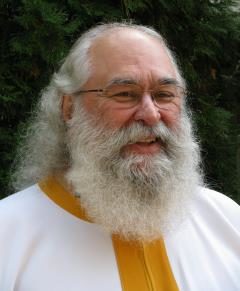 Rev. Jaganath, Integral Yoga Minister and Raja Yoga master teacher, has spent a lifetime delving into the deepest layers of meaning in Patanjali’s words within the Yoga Sutras. Our series continues with sutras: 2.24 – 2.25, in which Patanjali continues his teachings on ignorance and how its removal leads to Yoga’s goal of kaivalya or liberation.
Rev. Jaganath, Integral Yoga Minister and Raja Yoga master teacher, has spent a lifetime delving into the deepest layers of meaning in Patanjali’s words within the Yoga Sutras. Our series continues with sutras: 2.24 – 2.25, in which Patanjali continues his teachings on ignorance and how its removal leads to Yoga’s goal of kaivalya or liberation.
Sutra 2.24: tasya hetur avidyā
The cause of this union is ignorance (Swami Satchidananda translation). Ignorance is the cause of confusing the Seer and seen as one
(Rev. Jaganath translation).
tasya = of this; its
hetuḥ = cause; reason (See 2.17)
avidyā = ignorance; delusion (See 2.3, 2.4, 2.5, 2.24); refer to 2.3 for more on avidya.
Sutra 2.25: tad-abhāvāt samYoga-abhāvo hānam tad-dṛśeh kaivalyam
Without this ignorance, no such union occurs. This is the independence of the Seer (Swami Satchidananda translation). Without ignorance, this confusion ceases to exist. The Seer stands apart from the seen as the Self. This is liberation (kaivalya) (Rev. Jaganath translation).
tad = (refers to ignorance); that
abhāvāt = without; absence, nonexistence, negation, removal, to nullify, non-entity
from a = not + bhāva = being, from bhụ = to be (See 1.10)
Abhavat, in the world of philosophy, is also the presentation of a proof of something based on the non-existence of something else. For example, if there are no mice, there must be cats. If there is liberation, there must be no confusion.
samYoga = correlation (See 2.17)
abhāvaḥ = no such; absent, nonexistent (See above and 1.10)
hānam = stands apart; removal, absence, escape, giving up, relinquishing, abandoning, cessation, stand apart, getting rid of, want, lack
from hā = depart
To stand apart indicates distinctive qualities that mark something as different from other things.
tat = (refers to the Seer); that
dṛśeh = the seen (See 2.20)
kaivalyam = pure, free; liberation, independence, isolation, aloneness, single, unitary, uncompounded, release, total separation, transcendent aloneness (See 2.25, 3.51, 3.56, 4.26. 4.34)
from kevala = alone, not connected to anything
Kaivalya is often translated as isolation or aloneness, the idea being that kaivalya results from isolating — discriminating the difference between — the ego-based self that seems to have consciousness as a property and the pure consciousness that is the Purusha. In this sense, kaivalya is liberation or release from ignorance and the suffering it brings.
Kaivalya is also described by Patanjali (4.34) as the return to the origin (pratiprasava) of the gunas. The same sutra goes on to say kaivalya is the establishment of the nature and power of higher awareness (citi-shakti). The mind is no longer limited to being the holder of ignorance and the center of self-identity.
Kaivalya can also refer to pure seeing, the experience of the Purusha’s innate capacity for unconditioned, unlimited, unchanging knowing of the contents of the mind. In sutra 3.56, kaivalya is said to be experienced when the sattva of individual mind reaches a state of purity analogous to that of the Purusha.
About the Author:
 Reverend Jaganath Carrera is and Integral Yoga Minister and the founder/spiritual head of Yoga Life Society. He is a direct disciple of world renowned Yoga master and leader in the interfaith movement, Sri Swami Satchidananda—the founder and spiritual guide of Satchidananda Ashram–Yogaville and Integral Yoga International. Rev. Jaganath has taught at universities, prisons, Yoga centers, and interfaith programs both in the USA and abroad. He was a principal instructor of both Hatha and Raja Yoga for the Integral Yoga Teacher Training Certification Programs for over twenty years and co-wrote the training manual used for that course. He established the Integral Yoga Ministry and developed the highly regarded Integral Yoga Meditation and Raja Yoga Teacher Training Certification programs. He served for eight years as chief administrator of Satchidananda Ashram–Yogaville and founded the Integral Yoga Institute of New Brunswick, NJ. He is also a spiritual advisor and visiting lecturer on Hinduism for the One Spirit Seminary in New York City. Reverend Jaganath is the author of Inside the Yoga Sutras: A Sourcebook for the Study and Practice of Patanjali’s Yoga Sutras, published by Integral Yoga Publications. His latest book, Patanjali’s Words, is coming soon from Integral Yoga Publications.
Reverend Jaganath Carrera is and Integral Yoga Minister and the founder/spiritual head of Yoga Life Society. He is a direct disciple of world renowned Yoga master and leader in the interfaith movement, Sri Swami Satchidananda—the founder and spiritual guide of Satchidananda Ashram–Yogaville and Integral Yoga International. Rev. Jaganath has taught at universities, prisons, Yoga centers, and interfaith programs both in the USA and abroad. He was a principal instructor of both Hatha and Raja Yoga for the Integral Yoga Teacher Training Certification Programs for over twenty years and co-wrote the training manual used for that course. He established the Integral Yoga Ministry and developed the highly regarded Integral Yoga Meditation and Raja Yoga Teacher Training Certification programs. He served for eight years as chief administrator of Satchidananda Ashram–Yogaville and founded the Integral Yoga Institute of New Brunswick, NJ. He is also a spiritual advisor and visiting lecturer on Hinduism for the One Spirit Seminary in New York City. Reverend Jaganath is the author of Inside the Yoga Sutras: A Sourcebook for the Study and Practice of Patanjali’s Yoga Sutras, published by Integral Yoga Publications. His latest book, Patanjali’s Words, is coming soon from Integral Yoga Publications.
